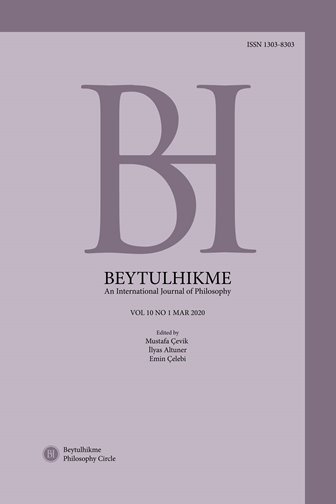Author :
Abstract
1930’lar Türkiyesi oldukça tartışmalı bir sosyo-politik başlıktır. Bu konuda iki temel pozisyon saptanabilir: liberal-pozitivist olan 1930’lardaki dönüşümü ilerici bir hamle olarak görürken muhafazakar-idealist ise onu yukarıdan aşağı bir şekilde tarih ve gelenekten kopuş olarak değerlendirir. Bununla birlikte, ikisi arasında köprü olan başka okumalar da vardır. İşte bu çalışma, bunlardan birini çözümlemek için Mustafa Şekib Tunç, (1886-1958), bir Türk psikolog ve filozof, Henri Bergson (1859-1941), bir Fransız filozof, Emile Durkheim (1858-1917) bir Fransız sosyolog ve Antonio Gramsci (1891-1937) bir İtalyan filozof, arasında sonuncunun “pasif devrim” kavramı üzerinden 1930’lar Türkiye’sinin sosyo-politik dönüşümünü anlamaya katkı sunmak için bağlantılar kurmayı önermektedir. Temel argüman, anti-amprisist ve anti-pozitivist felsefesine ve Bergson’un spiritualist ve biyolojik-bütüncülllüğüne yaslanmasına rağmen, Tunç’un düşüncelerinin Durkheim’ın pozitivist kolektivizmi ile buluşmaktadır. Bu, Tunç’un temel ifadesini “imtiyazsız-sınıfsız-kaynaşmış-kitle” ve organik toplum formülasyonunda bulan 1930’ların pasif devrimini bir “muhafazakar devrim” olarak yorumlamasını mümkün kılmaktadır. Tunç, Bergson’u izleyerek, tarihi ve toplumu biyolojik bir şekilde, toplum içindeki sosyo-politik bölünmeleri ve mücadeleleri maskelemeye yarayan sosyo-işlevsel bir bütün olarak kavrar.
Keywords
Abstract
The 1930s in Turkey is a highly controversial socio-political topic with two main competing interpretations: the liberal-positivists consider the 1930’s transformation as a progressive move whereas conservative-idealists regard it as a top-down break from tradition and history. However, there are other readings that bridge these two positions. To analyze one of these, this study establishes links between Mustafa Şekib Tunç (1886-1958), a Turkish psychologist and philosopher, the French philosopher Henri Bergson (1859-1941), the French sociologist Emile Durkheim (1858-1917), and the Italian philosopher Antonio Gramsci (1891-1937). It does this through the latter’s concept of “passive revolution” to contribute to the understanding of Turkey’s socio-political transformation during the 1930s. The main argument is that Tunç’s anti-empiricist and anti-positivist philosophy, based on Bergson’s spiritualist and biologist-holisticism, meets with Durkheim’s positivist collectivism. This enables Tunç to interpret the 1930s’ passive revolution as a “conservative revolution” that found its expression in the formulation of the “unprivileged-classless-fused-mass” and an “organic society”. Tunç, following Bergson, conceives history and society biologically, as a socio-functional whole that helps mask socio-political divisions and struggles within the society.
Keywords
- Bayraktar, L. (1998). Bergsonculuğun Türkiye’ye Girişi ve İlk Temsilcileri. Felsefe Dünyası, 28, 62-72.
- Benton, T. & Craib, I. (2011). Philosophy of Science: The Philosophical Foundations of Social Thought. New York: Palgrave Macmillan.
- Berkes, N. (1998). The Development of Secularism in Turkey. London: Hurst & Com- pany.
- Bhaskar, R. (1998). The Possibility of Naturalism: A Philosophical Critique of the Con- temporary Human Sciences (Critical Realism–Interventions). New York: Routledge.
- Bozkurt, N. (1995). 20. Yüzyıl Düşünce Akımları: Yorumlar ve Eleştiriler. İstanbul: Sarmal Yayınevi.
- Demirel, T. (2002). 1946 Sonrası Muhafazakâr Modernleşmeci Eğilimler Üzerine Bazı Değinmeler. (Ed. U. Kocabaşoğlu). Modern Türkiye’de Siyasî Düşünce 3: Modernleşme ve Batıcılık. İstanbul: İletişim Yayınları, 218-239.
- Gramsci, A. (1971). Selections from the Prison Notebooks of Antonio Gramsci. (Eds. & Trans. Q. Hoare & G. N. Smith). London: Lawrence & Wishart.
- İrem, N. (2002b). Turkish Conservative Modernism: Birth of a Nationalist Quest for Cultural Renewal. International Journal of Middle East Studies, 34 (1), 87-112.
- İrem, N. (1999). Muhafazakar Modernlik; Diğer Batı ve Türkiye’de Bergsonculuk. Toplum ve Bilim, 82, 141-179.
- İrem, N. (2002a). Cumhuriyetçi Muhafazakarlık, Seferber Edici Modernlik ve Diğer Batı Düşüncesi. Ankara Üniversitesi SBF Dergisi, 57(2), 41-60.
- İrem, N. (2003). Bir Değişim Siyaseti Olarak Türkiye’de Cumhuriyetçi Muhafa- zakârlık. Modern Türkiye’de Siyasi Düşünce, 5, 105-117.
- Oğuz, M. C. (2015). Mustafa Şekip Tunç ve Türkiye’de Bergsonculuk. Artvin Çoruh Üniversitesi Uluslararası Sosyal Bilimler Dergisi, 1 (1), 90-109.
- Parla, T. (1985). The Social and Political Thought of Ziya Gökalp. Leiden: E.J. Brill.
- Tunç, M. Ş. (2005). Terakki Fikri. (Haz. O. Bahadır). İstanbul: Anahtar Kitaplar Yayınevi.
- Tunç, M. Ş. (1954). Muhafazakarlık ve Liberallik. Türk Düşüncesi, 1 (2), 89.
- Tunç, M. Ş. (2010). Liberallik ve Şuurlu Muhafazakarlık. Muhafazakar Düşünce 25– 26, 99-103.
- Ülken, H. Z. (1992). Türkiye’de Çağdaş Düşünce Tarihi. İstanbul: Ülken Yayınları.
- Yalman, G. (2002). The Turkish State and the Bourgeoisie in a Historical Pers- pective: A Relativist Paradigm or A Panoply of Hegemonic Strategies? The Politics of Permanent Crisis: Class, Ideology and State in Turkey. (Eds. N. Balkan & S. Savran). New York: Nova Science Publishers, 21-54.
- rini çözümlemek için Mustafa Şekib Tunç, (1886-1958), bir Türk psikolog ve fi-





